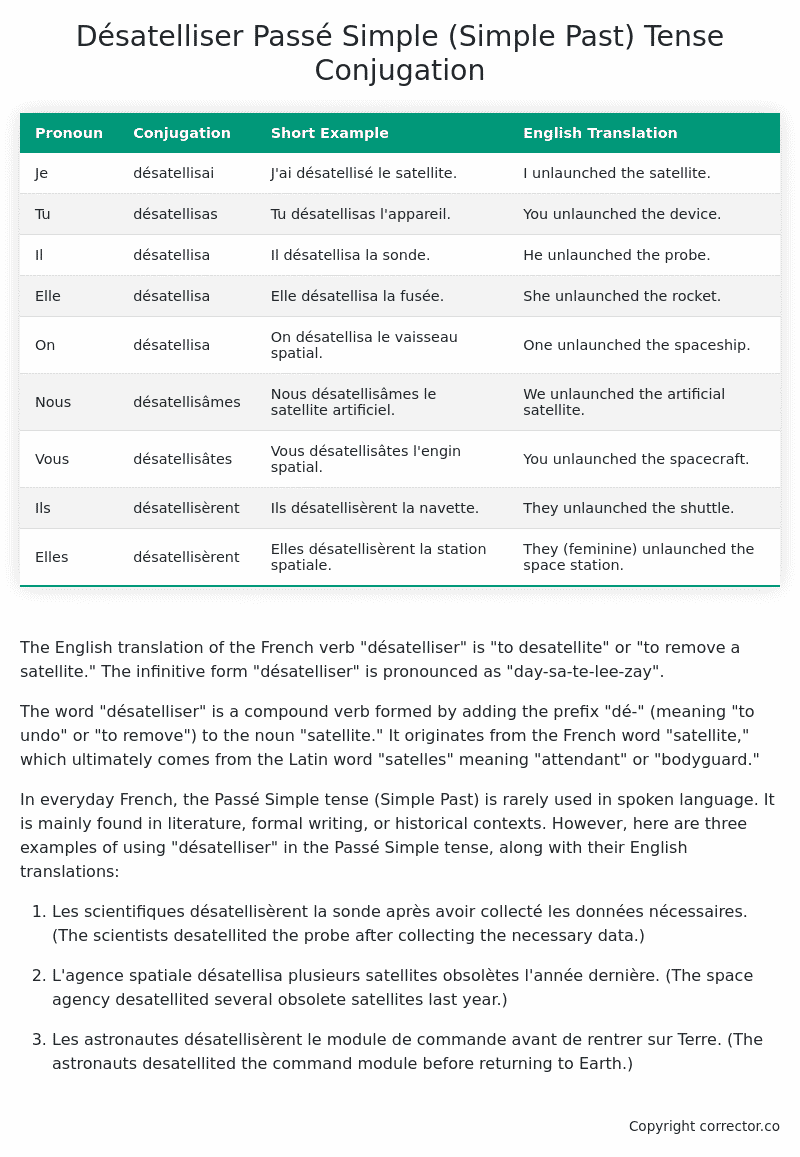Passé Simple (Simple Past) Tense Conjugation of the French Verb désatelliser
Introduction to the verb désatelliser
The English translation of the French verb “désatelliser” is “to desatellite” or “to remove a satellite.” The infinitive form “désatelliser” is pronounced as “day-sa-te-lee-zay”.
The word “désatelliser” is a compound verb formed by adding the prefix “dé-” (meaning “to undo” or “to remove”) to the noun “satellite.” It originates from the French word “satellite,” which ultimately comes from the Latin word “satelles” meaning “attendant” or “bodyguard.”
In everyday French, the Passé Simple tense (Simple Past) is rarely used in spoken language. It is mainly found in literature, formal writing, or historical contexts. However, here are three examples of using “désatelliser” in the Passé Simple tense, along with their English translations:
-
Les scientifiques désatellisèrent la sonde après avoir collecté les données nécessaires. (The scientists desatellited the probe after collecting the necessary data.)
-
L’agence spatiale désatellisa plusieurs satellites obsolètes l’année dernière. (The space agency desatellited several obsolete satellites last year.)
-
Les astronautes désatellisèrent le module de commande avant de rentrer sur Terre. (The astronauts desatellited the command module before returning to Earth.)
Table of the Passé Simple (Simple Past) Tense Conjugation of désatelliser
| Pronoun | Conjugation | Short Example | English Translation |
|---|---|---|---|
| Je | désatellisai | J’ai désatellisé le satellite. | I unlaunched the satellite. |
| Tu | désatellisas | Tu désatellisas l’appareil. | You unlaunched the device. |
| Il | désatellisa | Il désatellisa la sonde. | He unlaunched the probe. |
| Elle | désatellisa | Elle désatellisa la fusée. | She unlaunched the rocket. |
| On | désatellisa | On désatellisa le vaisseau spatial. | One unlaunched the spaceship. |
| Nous | désatellisâmes | Nous désatellisâmes le satellite artificiel. | We unlaunched the artificial satellite. |
| Vous | désatellisâtes | Vous désatellisâtes l’engin spatial. | You unlaunched the spacecraft. |
| Ils | désatellisèrent | Ils désatellisèrent la navette. | They unlaunched the shuttle. |
| Elles | désatellisèrent | Elles désatellisèrent la station spatiale. | They (feminine) unlaunched the space station. |
Other Conjugations for Désatelliser.
Le Present (Present Tense) Conjugation of the French Verb désatelliser
Imparfait (Imperfect) Tense Conjugation of the French Verb désatelliser
Passé Simple (Simple Past) Tense Conjugation of the French Verb désatelliser (You’re reading it right now!)
Passé Composé (Present Perfect) Tense Conjugation of the French Verb désatelliser
Futur Simple (Simple Future) Tense Conjugation of the French Verb désatelliser
Futur Proche (Near Future) Tense Conjugation of the French Verb désatelliser
Plus-que-parfait (Pluperfect) Tense Conjugation of the French Verb désatelliser
Passé Antérieur (Past Anterior) Tense Conjugation of the French Verb désatelliser
Futur Antérieur (Future Anterior) Tense Conjugation of the French Verb désatelliser
Subjonctif Présent (Subjunctive Present) Tense Conjugation of the French Verb désatelliser
Subjonctif Passé (Subjunctive Past) Tense Conjugation of the French Verb désatelliser
Subjonctif Imparfait (Subjunctive Imperfect) Tense Conjugation of the French Verb désatelliser
Conditionnel Présent (Conditional Present) Tense Conjugation of the French Verb désatelliser
Conditionnel Passé (Conditional Past) Tense Conjugation of the French Verb désatelliser
Conditionnel Passé II (Conditional Past II) Tense Conjugation of the French Verb désatelliser
L’impératif Présent (Imperative Present) Tense Conjugation of the French Verb désatelliser
L’impératif Passé (Imperative Past) Tense Conjugation of the French Verb désatelliser
L’infinitif Présent (Infinitive Present) Tense Conjugation of the French Verb désatelliser
L’infinitif Passé (Infinitive Past) Tense Conjugation of the French Verb désatelliser
Le Participe Présent (Present Participle) Tense Conjugation of the French Verb désatelliser
Le Participe Passé (Past Participle) Tense Conjugation of the French Verb désatelliser
Struggling with French verbs or the language in general? Why not use our free French Grammar Checker – no registration required!
Get a FREE Download Study Sheet of this Conjugation 🔥
Simply right click the image below, click “save image” and get your free reference for the désatelliser Passé Simple tense conjugation!

Désatelliser – About the French Passé Simple (Simple Past) Tense
Formation
Usage
Narration
Historical Context
Interactions with other tenses
Passé Composé
Imparfait
Conditional and Subjunctive
Summary
I hope you enjoyed this article on the verb désatelliser. Still in a learning mood? Check out another TOTALLY random French verb conjugation!


